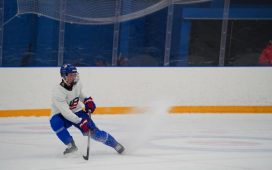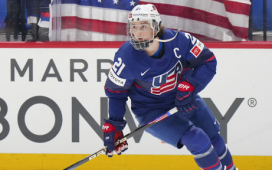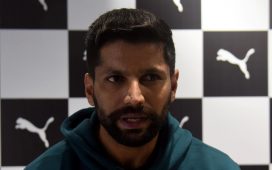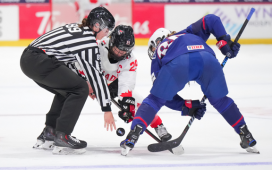Former NHLer Graeme Townshend can relate to Akim Aliu’s situation, but in Townshend’s case, the matter was dealt with immediately. He forgave his coach and shared his thoughts.
This article is the second in a series examining the culture of hockey, how deep its problems may be and what some are proposing to change it.You can also read the first, senior writer Matt Larkin’s Progressive Minds Argue Need For Complete Overhaul.
• • •
While Bill Peters’ coaching future with the Calgary Flames hangs in the balance as the team investigates an alleged racial slur from his days coaching in the AHL, a black former NHLer who was both subject to similar treatment more than three decades ago and has worked with Peters in the past offered his own perspective on the matter.
And regardless of your opinion, Graeme Townshend’s message is one worth hearing. That TheHockeyNews.com is publishing his story is neither to indict nor support Peters, but an attempt to identify the complexities of this thorny issue. Bear in mind, tolerance levels have changed significantly in the 30 years between Townshend’s incident and the one told by Akim Aliu. That’s not an excuse, but reality.
First, the backstory. In 1989, late in Townshend’s senior year at RPI, coach Mike Addesa was fired after he directed racially charged comments to Townshend and another black teammate, saying something to the effect of, “If you don’t put forth a greater effort, the world will only see you as a stereotypical n—er.” Townshend, who was 23 at the time, said he went directly to Addesa’s office, confronted his coach and they worked out their differences. Addesa’s remarks were subsequently reported by another player to university administration and Addesa was fired. (It should be noted Addesa was hired in later years by the Detroit Red Wings, Flames and Vancouver Canucks as a scout.) Townshend defended Addesa at the time and still does, maintaining it was an isolated, regretful incident.
“My coach is, and was not, a racist,” said Townshend, who played 45 NHL games with three organizations. “He got pissed off and it slipped and we talked about it literally a half hour after he said it and it was over. And it didn’t come out in the paper until the end of the season because people in the administration didn’t like the coach. They used me to punish the coach and that’s not fair.”
That’s where Townshend has a problem with the Peters story. If a player was offended by something Peters said, Townshend maintains it should have been dealt with in private nine years ago when it happened, not on social media in 2019. (Aliu told TSN: “What am I going to say? I was 20 years old and a first-year pro. I was too scared to speak up. I beat myself up every day over it.”)
Townshend believes the same about Peters as he does his college coach. In a fateful twist, Townshend worked with Peters in the mid-1990s when he was winding up his playing career. Townshend was playing in the now-defunct International League for the Houston Aeros and was also running hockey schools in Texas. Peters was operating a youth hockey program in San Antonio and hired him in to work with some of the students.
“He brought me in. A black guy,” Townshend said. “He could have picked a hundred different people and he picked the one black person who ran hockey schools. If he was a racist, why would he do that? He could have picked 50 white guys and he picked me.”
Townshend said not everyone who utters a slur is necessarily a racist. Addesa made a bad choice, but Townshend said the coach’s usual conduct was more telling about his makeup. Addesa not only heavily recruited him, Townshend said, he also made him a captain and had his back on other occasions.
“If you were a racist, why would you name a black guy your captain? Does that make any sense?” Townshend said. “If he hates black people so much, why would he put me in a position to lead his hockey team? He slipped up one time, one error, one mistake. I’ve made a lot of mistakes, too. In fact, I’ve made mistakes at school that should have gotten me kicked off the team and that guy, Mike Addesa, he helped me. He could have gotten rid of me so many times and he didn’t. I cut classes and things like that. I should have been kicked off the team for cutting classes. And he could have taken my scholarship away, too. I had seen him to that to other guys who broke team rules. He didn’t do that to me, though. If he wanted to get rid of me and he was a racist, he had three other opportunities to do that and he never did.”
Townshend said he encountered other instances of racial slurs during his time at RPI. A classmate, with whom Townshend is still close, commonly used the N-word, even in his presence. The two even had fistfights over it. “And then it came to a point where we were having a couple of beers together and I said, ‘Hey man, this is what that word means and this is how it makes me feel,’ ” Townshend said. “And right away, instantly, this guy changed and never used the word again. Ever. So imagine now if he were a CEO somewhere and I come in and say, ‘Thirty years ago, so-and-so said this,’ and he’s going to lose his job for that? That’s unfair.”
Townshend knows he only speaks only for himself and his experiences. He chose, and still chooses, to treat words for what they are. “The word ‘n—er’ is just a word to me, honest to God,” he said. “It’s just a word and it only hurts me if I allow it to. You could call me a bunch of other things that would probably hurt me more than that word. The time to take care of it is immediately. Do it right away and call the person out to his face. That’s how I think you should deal with these things.”
Want more in-depth features, analysis and an All-Access pass to the latest content? Subscribe to The Hockey News magazine.








